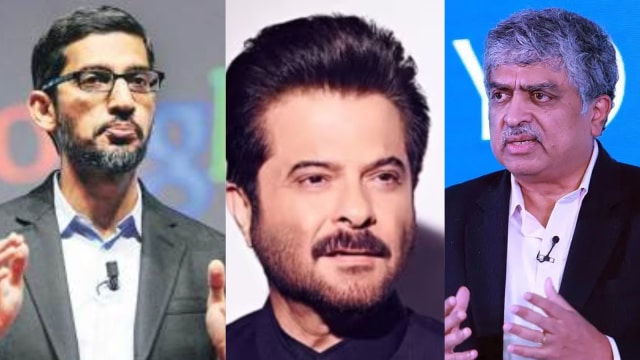From Sundar Pichai to Nandan Nilekani: 15 Indians feature in ‘TIME100 AI’ list
The list also includes India's Railway Minister Ashwini Vaishnaw, UN Secretary General's Envoy Amandeep Singh Gill, Microsoft CEO Satya Nadella, actor Anil Kapoor and Indian-American businessman Vinod Khosla.
 Google CEO Sundar Pichai, Actor Anil Kapoor, and Infosys Co-founder Nandan Nilekani. (L-R)
Google CEO Sundar Pichai, Actor Anil Kapoor, and Infosys Co-founder Nandan Nilekani. (L-R)From Google CEO Sundar Pichai to actor Anil Kapoor, 15 Indians and those of Indian descent featured among the 100 most influential people in artificial intelligence (AI) in the second edition of TIME magazine’s ‘TIME100 AI’ list.
The list, which was released on Thursday, also included India’s Railway Minister Ashwini Vaishnaw, United Nations Secretary General’s Envoy Amandeep Singh Gill, Microsoft CEO Satya Nadella, and Indian-American businessman Vinod Khosla.
The top 100 list is divided into four parts – leaders, innovators, shapers, and thinkers. It recognises achievers across a wide age span, from 15-year-old Francesca Mani, who campaigns across the US for the protection of deepfake victims, to 77-year-old Andrew Yao, a leading Chinese computer scientist who recently called for a global AI regulatory body.
While the TIME100 AI list features prominent figures such as Open AI’s Sam Altman, xAI’s Elon Musk, and Nvidia’s Jensen Huang, it also indicates the increasing influence of Indians and those of Indian descent in the field of Artificial Intelligence. Here’s a look at them:
Sundar Pichai, CEO of Google and Alphabet
Google’s dominance in AI is challenged by the success of ChatGPT, that came from a startup backed by its major competitor – Microsoft. Google CEO Sundar Pichai, who joined in 2004, and became CEO in 2015, took the challenge in stride. In an interview with the TIME, Pichai said, “Google wasn’t the first to build a search engine, but was the first to build one good enough to attract the lion’s share of the market.”
“Facing that giant risk to its business, Google has begun to introduce generative AI tools into products with billions of users, the most visible being Google Search, where new “AI Overviews” are now appearing above the familiar 10 blue links,” the TIME said.
Satya Nadella, CEO, Microsoft
In 1993, Satya Nadella, then a marketing manager at Microsoft and “sporting ’70s-style glasses and a full head of hair,” was featured in a video promoting the emerging technology of Microsoft Excel.
Three decades later, Nadella, now CEO of Microsoft, is focused on achieving artificial general intelligence (AGI). In 2019, he spearheaded Microsoft’s $1 billion investment in OpenAI, which has since evolved into a $13 billion profit-sharing deal. OpenAI relies on Microsoft’s cloud computing expertise—an area Nadella transformed into a global leader before becoming CEO—to advance AGI.
Rohit Prasad, SVP and head scientist of AGI, Amazon
“Developing AGI —or an AI smart as a human—is the “north star” for Amazon’s Rohit Prasad, who jumped from being Alexa’s head scientist to running a newly-created Amazon AI team last year,” TIME said.
This year, Prasad’s team hired several leaders from the AI startup Adept and paid for a licence to use some of its technology. Additionally, Amazon is making efforts to integrate AI into Alexa. “What matters is the journey that drives us—relentless pursuit of developing the most advanced, trusted and sustainable AI that anyone, anywhere can use with minimal effort, Prasad said to TIME.
Aravind Srinivas, CEO, Perplexity
The 30-year-old faced backlash from online publishers for Perplexity’s model of using AI to summarise websites and divert ad revenue. In June this year, the company introduced “Perplexity Pages,” a feature that creates AI-generated reports. However, it appeared to plagiarise content from various publications, often with inadequate or inaccurate citations. Due to several companies accusing Perplexity of plagiarism, it now highlights its sources more prominently.
Shiv Rao, Co-founder and CEO, Abridge
Doctors frequently spend twice as much time on paperwork as they do with patients. “The paperwork deluge is more than just soul-crushing—it’s contributing to what Shiv Rao, the co-founder and CEO of AI-powered medical scribe startup Abridge, and a practising cardiologist at the University of Pittsburgh Medical Center, describes as a “public health emergency” of doctor burnout,” said TIME.
With patient consent, Abridge records doctor visits, automatically transcribes them, and generates summaries for both the patient and other physicians.
Anant Vijay Singh, Product Lead at Proton
Since last year, tech giants such as Meta, X, Microsoft, and Zoom have subtly updated their terms of service to permit the use of customer data for AI training.
“Since 2014, Proton, the Swiss privacy company, has battled threats to their users’ data from authoritarian regimes and hackers. Now, the threat was coming from within the tech industry itself. For 32-year-old Anant Vijay Singh, Proton’s Product Lead, the mission became urgent. “Challenging Big Tech is hard,” he said, “But that’s what excited me.” Singh is leading an approach that uses AI to enhance privacy, not undermine it.
Amba Kak, Co-executive Director, AI Now Institute
The AI Now Institute, co-directed by Indian-origin Kak, focuses on the impact of the AI revolution. Kak frequently advises Congress, the White House, the European Commission, and the UK government on AI policy.
Dwarkesh Patel, Host, Dwarkesh Podcast
“Over the past four years, Dwarkesh Patel, a 23-year-old Bay Area resident, has built one of the most deeply-researched podcasts on AI (among other subjects). Patel has quickly become known for his thorough and technical explorations of the subject, becoming vital listening for those working on the technology. His work has earned him praise from the likes of Jeff Bezos and Mark Zuckerberg, who appeared on the Dwarkesh Podcast in April,” TIME reported.
Amandeep Singh Gill, United Nations Secretary-General’s Envoy on Technology
Amandeep Singh Gill is leading global AI governance as the UN Secretary-General’s Envoy on Technology. He coordinates digital cooperation among member states, industry, and civil society, implements UN Secretary-General António Guterres’ AI priorities, and shapes international engagement with the technology.
Arati Prabhakar, Director, U.S. Office of Science and Technology Policy
Prabhakar’s team ensures that the risks and benefits of technology are balanced. Formerly the director of DARPA, Prabhakar is the White House’s first technology officer with a defence background.
She sees the US’s AI efforts as a strategic competition with China but also believes there will be opportunities for agreement, especially on safety standards.
Ashwini Vaishnaw, Minister of Electronics and Information Technology, India
India, the world’s fifth-largest economy, is trying to become a key player in AI under the leadership of its electronics and IT minister, Aishwini Vaishnaw. Although it lacks binding AI laws, India chaired the Global Partnership on AI last year, promoting international AI governance.
In July, India hosted the Global IndiaAI Summit, attended by more than 2,000 AI experts, including leaders from OpenAI and Microsoft, and delegates from over 50 countries. Vaishnaw stressed on the need to “democratise technology” to ensure it is accessible to all.
Nandan Nilekani, Co-founder, Infosys and co-founder & chairman, EkStep
“Like many other tech billionaires, Nilekani, 69, is optimistic about AI’s potential, but has thoughts on how to ensure the technology’s rewards are distributed widely,” TIME reported.
Nilekani-led India’s Aadhaar programme, the largest biometric identity card system in the world. He promoted the programme as a solution to welfare fraud, a tool for improving tax collection, and a means to simplify bank customer verification, among other benefits.
Anil Kapoor, Actor
While the members of Screen Actors Guild – American Federation of Television and Radio Artists were fighting Hollywood studios over unauthorised AI use of their replicas, Indian actor Anil Kapoor achieved a landmark victory in the Delhi High Court in September after a large number of distorted videos, gifs, and emojis of his likeness began circulating online due to the unauthorised use of AI.
Vinod Khosla, Founder, Khosla Ventures
After a 2011 skiing accident left Vinod Khosla with a knee injury, the venture capitalist wrote in a controversial article that AI could outperform doctors. Since then, his firm has invested in various robotics and medtech companies, including Rad AI. Khosla strongly believes AI can replace jobs, including those of teachers and doctors, and create a future where humans are free from routine tasks.
Divya Siddarth, Co-founder, Collective Intelligence Project
Indian-origin Divya Siddarth and Saffron Huang founded the nonprofit, Collective Intelligence Project (CIP), to ensure ordinary people have a voice in shaping transformative technologies such as AI.





- 01
- 02
- 03
- 04
- 05


























